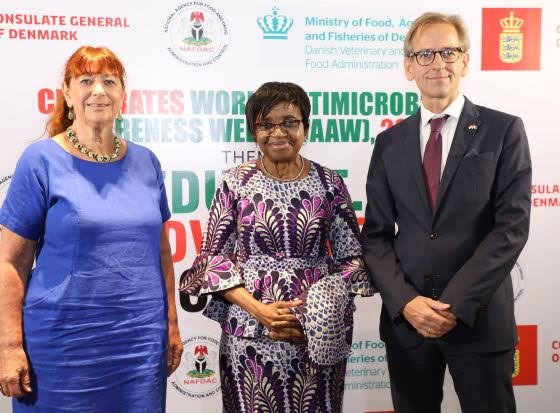In an effort to address the growing issue of antimicrobial resistance (AMR) on a global scale, the National Agency for Food and Drug Administration and Control (NAFDAC), in collaboration with the Danish Embassy, organized a two-day workshop for stakeholders in Lagos to commemorate the 2024 World Antimicrobial Awareness Week (WAAW).
The event emphasized the concerning increase in infections resistant to treatments that were once effective, with Prof. Adeyeye bringing attention to instances involving newborns in Nigerian teaching hospitals.
In a statement released by Sayo Akintola, Resident Media Consultant, and shared with the Africa Health Report (AHR) on Sunday, December 8, 2024, a workshop titled “Educate. Advocate. Act Now” focused on the growing concern of antimicrobial resistance (AMR), often referred to as the “Silent Pandemic.”
“AMR endangers decades of medical progress, threatening surgeries, medical procedures, and the treatment of common infections,” Prof. Adeyeye said.
She emphasized the wide-ranging impact of AMR on human health, animal welfare, and the environment, stressing the need for a unified national and global response.
“Antimicrobial resistance is not a distant threat; it is already impacting our lives,” warned Prof. Mojisola Adeyeye, Director General of the National Agency for Food and Drug Administration and Control (NAFDAC).
NAFDAC outlined a series of measures to curb AMR, including:
Limiting antibiotics formulations to two active pharmaceutical ingredients to prevent overuse.
Educating livestock farmers on using organic acids and probiotics as alternatives to antibiotics.
Restricting Colistin usage in animal feed, aligning with WHO’s classification of the drug as a last-resort antibiotic for humans.
Increased awareness campaigns among pharmacists, veterinarians, and farmers were also spotlighted as a key strategy. “We must educate our colleagues not to sell antibiotics indiscriminately,” Prof. Adeyeye stressed, urging improved antibiotic stewardship.
Jens Ole Bach Hansen, Danish Ambassador to Nigeria, described the partnership as a critical step toward addressing AMR through knowledge sharing and capacity building. “AMR is one of the major causes of death worldwide and demands global solutions,” he said.
The Danish Fellowship Centre, a key partner in the collaboration, is conducting training on food safety, disease control, and the One Health approach to support Nigeria’s efforts. Ambassador Hansen reaffirmed Denmark’s commitment to assisting Nigeria in combating AMR.
The workshop concluded with a call for concerted efforts to ensure prudent antimicrobial use, improve AMR data collection, and enhance international cooperation to safeguard antimicrobials for future generations.




Blue Techker This is my first time pay a quick visit at here and i am really happy to read everthing at one place